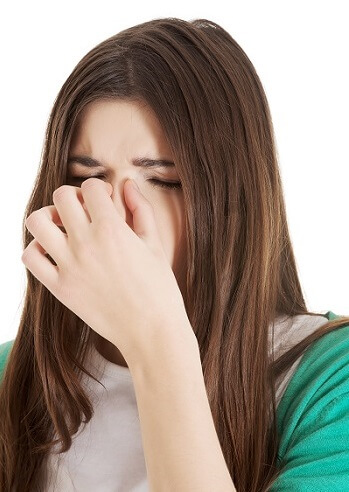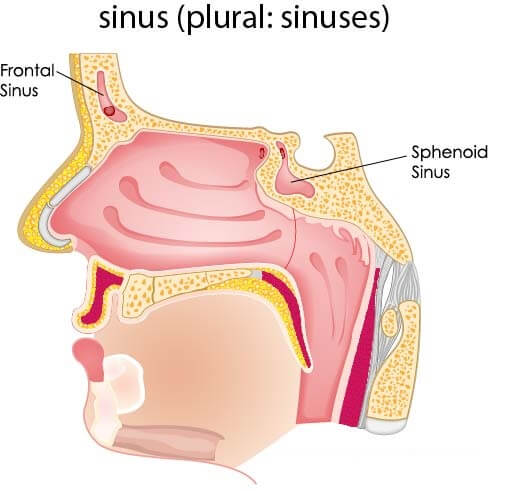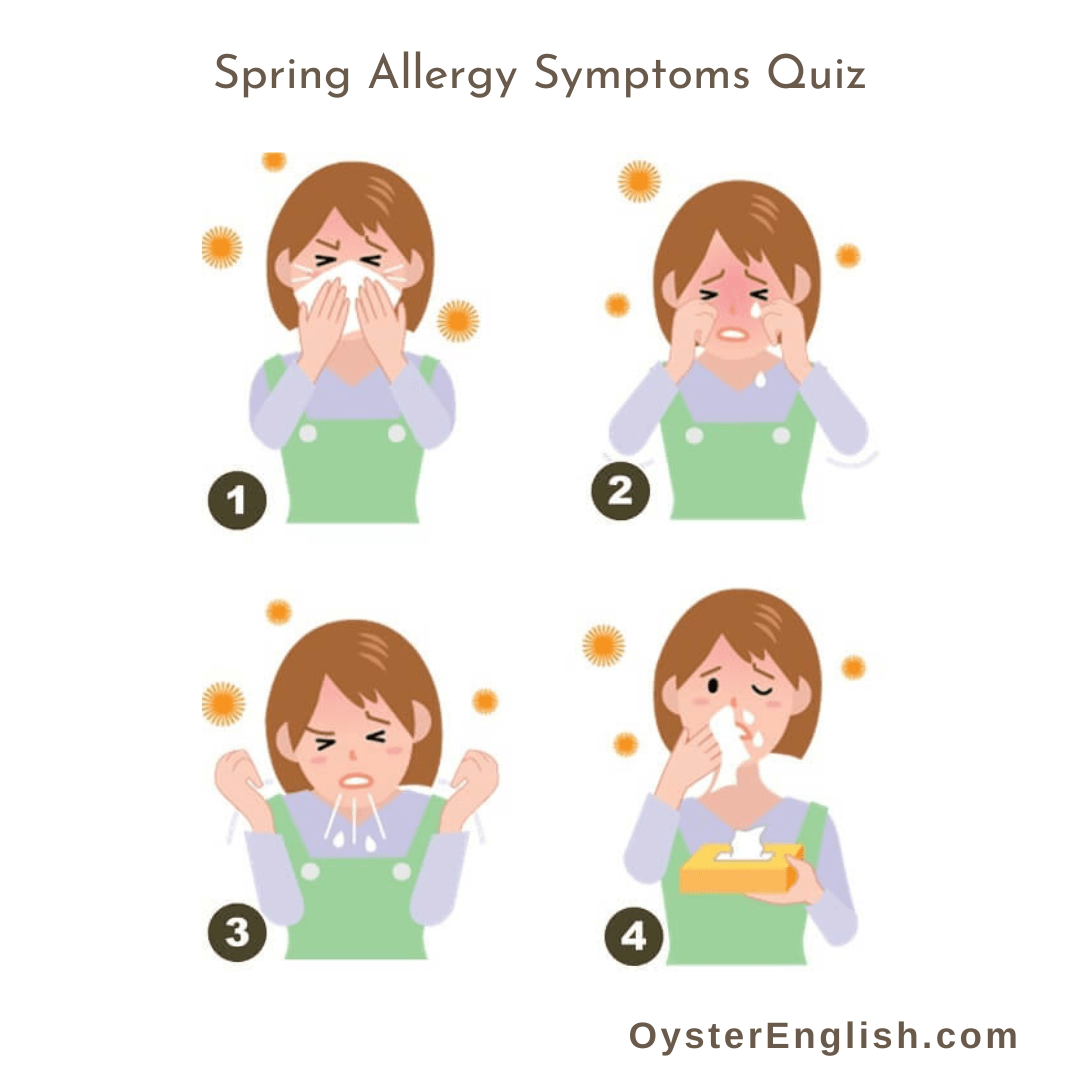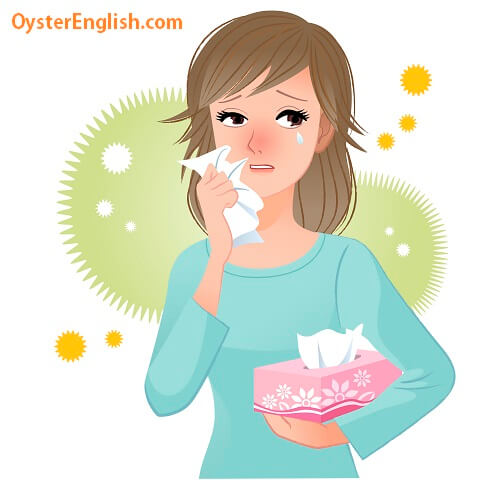Learn spring allergies vocabulary
Ahhhhh chooooo! When you hear that sound frequently there's a good chance that spring has sprung! It's a great time to review some spring allergies vocabulary.
spring (noun): a season between winter and summer when plants and flowers begin to grow.
spring (verb): to suddenly jump or move forward
Notes:
The past tense of the very "spring" is irregular: sprang (not springed)
The past participle is also irregular: sprung
Symptoms of pollen allergies
Many people realize spring has sprung (arrived) when they start to feel the symptoms that come from allergic reactions to pollen.
Pollen are the very small pieces of yellow dust that the wind and insects carry from plant to plant so they can produce seeds. We call this allergic reaction "hay fever."
When people have a severe reaction to pollen it's common for people to say "my allergies are killing me."
Their allergies don't actually kill them but the symptoms are very uncomfortable and irritating. It's hard to do much of anything when you cannot breathe easily—it's bothersome whether you're awake or trying to sleep.
You probably already know what eye, nose and throat mean (if not, click here to review the body vocabulary).
In English, we can describe common allergy symptoms as:
- stuffy nose
- runny nose
- runny eyes, watery eyes
- itchy eyes
- burning eyes
- itchy throat
- scratchy throat
- sinus pressure
- sneezing
- fatigue
Let's look at some of these symptoms in more detail.
Why "Runny" Nose and Eyes?
Just like a leaky faucet or a small river, a "runny" nose or eyes have fluids that don't just stay there. Since your body is trying to flush out those pesky allergens, it sends a stream of mucus down your nose and tears down your cheeks.
You'll hear people complain that their "eyes won't stop running" or "my nose has been running nonstop since yesterday."
Itchy Eyes
Itchy eyes are a signal from your body that it's trying to fight off an invader (like pollen). Note that we say "itchy eyes" when our eyes feel that annoying tickle but when we talk about what our eyes are doing, we say "my eyes are itching." It's one of those English quirks! But remember, rubbing itchy eyes can make it worse! Try some eye drops or a damp cloth instead to calm that irritating itch.
Scratchy vs. Scratching
And then there's the "scratchy" throat. Note: We say the throat feels "scratchy," not "scratching."
While "scratching" is what you might do to an itch on your skin, "scratchy" is the adjective we use to describe the unpleasant sensation inside your throat. It's that ticklish and uncomfortable feeling that makes you want to clear your throat constantly. This feeling is best soothed with throat lozenges or a nice cup of warm tea with a bit of soothing honey.
Sinus Pressure
If you do not know what the sinuses are, check out the diagram below.


- Sinuses are spaces in the head that connect to the nasal passages (nose).
- Sinus pressure happens when the sinuses become swollen (become larger) and you can feel pressure around the eyes, ears, cheeks and forehead.
This pressure can lead to headaches and a feeling of fullness in your face.
Sneezing Etiquette 101
Sneezing is the body's explosive reaction to kick out unwelcome guests like pollen and dust. Always sneeze into a tissue or your elbow to catch those invaders and keep them from spreading to others. Thanks to COVID-19, we're all pros at sneezing into our elbows or tissues. This isn't just polite; it helps keep those germs or allergens from traveling to someone else.
Can you match the symptoms to the pictures?

Pop Quiz!
Look at the picture above and write the names of each of the spring allergies symptoms the poor woman is experiencing. The answers are listed at the bottom of the page.
Dialogue Practice: Discussing Allergies with a Pharmacist
Understanding and expressing allergy symptoms in English can be an important skill, especially during the spring season. The dialogue below shows a common interaction with a pharmacist regarding pollen allergy symptoms. Pay close attention to the phrases and spring allergies vocabulary used, as they can be helpful in real-life situations. After reading, try to use these new terms when you practice this vocabulary.
Customer: I've got this annoying scratchy throat and my eyes are so itchy. Plus, I can't stop sneezing! I feel like a mess.
Pharmacist: I can see you're having a tough time. Your eyes are quite red. For the itchy eyes, some soothing eye drops might help. They're just over there, next to the tissues.
Customer: And what about my throat? It's so uncomfortable.
Pharmacist: A warm tea with honey could help soothe your throat. But if you prefer something you can use on-the-go, throat lozenges work well and are easy to carry with you. You can find them in Aisle 4.
Customer: I'm a mess. I've been sneezing all day, and my nose is like a leaky faucet!
Pharmacist: Oh, a nasal spray could help that runny nose. It will clear up the nasal passages.
Customer: Thank you. It's been a long week. I've been trying to work, but my head feels all stuffy, and there's this pressure that just won't let up.
Pharmacist: Sounds like you might be experiencing some sinus pressure. A simple pain reliever could ease the discomfort, but if it persists, a warm compress can be comforting too.
Customer: "Do you think I should see a doctor?"
Pharmacist: These remedies should offer some relief, but it's always a good idea to consult with your physician, especially if the symptoms continue or if they get worse. They can provide the best advice for your situation.
Customer: Thank you for your help. I will try these out immediately.
Your turn to practice this spring allergies vocabulary!
I've always loved Spring. Each year it paints my neighborhood with beautiful colors, popping out here and there like little fireworks competing for my attention. For about 5-6 years it also brought some unpleasant memories, casting a shadow over my daily walks and energy levels.
What does "casting a shadow" mean?
Well, although I adored the blossoms and greenery, the pollen made those months a time of struggle. Not only did my eyes itch and get watery but these times were also marked by headaches, constant tiredness and a feeling of lethargy. I would have to take over-the-counter medicines to cope with the symptoms. I don't know why but today, I do not have many problems with pollen allergies but I always remember that many people face these seasonal challenges.
As you know, practice makes progress. Why not pull out a piece of paper or your journal and write about your own experiences using the spring allergies vocabulary that we've just learned?
- Do you get allergies in the spring?
- Are you allergic to other things (e.g., foods, medicines, insects, animals).
- Describe something you're allergic to and the symptoms you experience.
For more information
For more in-depth information about pollen allergies and their triggers, visit the Asthma and Allergy Foundation of America's page on pollen allergies.
Quiz Answers
1. stuffy nose, runny nose
2. watery eyes, itchy eyes, burning eyes
3. sneezing (or coughing)
4. runny nose
- Home Page ›
- Main Vocabulary List ›
- Spring Allergies

